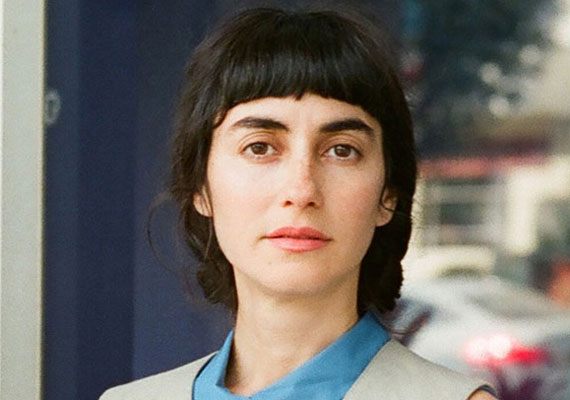Yaelle Kayam • Réalisatrice
"J'essaie, dans un sens, de faire tomber les murs"
par Sabine Kues
- La réalisatrice et scénariste Yaelle Kayam nous livre avec son premier long-métrage, Mountain, un conte sur les frontières géographiques et culturelles

Cet article est disponible en anglais.
The debut feature by Israeli director and screenwriter Yaelle Kayam, Mountain [+lire aussi :
critique
bande-annonce
interview : Yaelle Kayam
fiche film], tells a tale about an orthodox Jewish woman who lives on the Mount of Olives, a site dripping with a huge amount of symbology. The film, presented in the Orizzonti competition at the 72nd Venice Film Festival, and its protagonist cross both spatial and cultural borders. We talked to the director about her intentions in the movie.
Cineuropa: How did the film project come about?
Yaelle Kayam: Well, I'm really inspired by landscapes and especially cultural landscapes – not just geographical places, but also places that have historical and architectural meanings and are still relevant in our lives today. In my graduation film, Diploma, it was the city of Hebron in the West Bank that really touched me, and which I started exploring. And now it is the Mount of Olives. I was always really struck by the imagery of this place. It is this massive mountain covered with graves.
Diploma also plays with the theme of space and boundaries. Is that a key theme that runs through all of your work as a director?
Yes; because I write for landscapes and cultural landscapes, it's organic to the places I have spent time in. I mean, coming from and growing up in Israel, space and boundaries and walls are a part of your life, and it really feels like the walls are getting bigger. So I'm trying to break them down somehow.
In Mountain, there is tension between the orthodox woman and the Palestinian gravedigger. What was your concept behind this relationship?
Haitham Omari is a great actor, but I also chose him because he acted in Bethlehem [+lire aussi :
critique
bande-annonce
interview : Yuval Adler
fiche film], an Israeli film, and there he portrays the cruellest, scariest head of the Hamas terrorists. And this is something you see a lot: if you see a Palestinian, they are playing a terrorist, so I really wanted to take this man who in this film had put on an amazing performance as a very cruel man. And it's amazing how he can transform. He is the only one who really notices the main character and seems to sympathise with her emotions. The woman (Shani Klein) keeps toying with the boundaries, but she has a lot of boundaries in her head as well, and at the end of the day, there is an opportunity there, but she can't break free from her own boundaries to take that step.
Do you feel like you have a specific directing style?
Lee Strasberg had a method of acting, and sometimes I feel like I am a method director. So I just decided to go and spend time there and blend in, because it is a cemetery and a religious place. I started dressing as a religious person.
Would you say your films are politically motivated?
Yes, I would say Diploma definitely, and Mountain as well. Mountain also came from a very emotional and personal place. I was also exploring another way of just overcoming that image of if there is a Palestinian man, there is going to be a bomb at the end. Just to show that, actually, there are so many people who are just people. I wanted to turn that on its head and also break down the barrier between this woman, who is religious, which is an even bigger barrier, and this man, who is actually really gentle.
Are there more obstacles for female directors?
At least in Israel, there are definitely more obstacles you face as a female director. I think it's still new – not so much as a female screenwriter, but as a female director, definitely. For some people – but not for everybody – it's maybe harder to listen to or follow a female director, especially if you're young. In Israel, there is this saying: a director needs to be a general. And that's why I always mention Woody Allen when I work. “You see, not everyone is a general, and they are doing great.”
Your films have been shown at Cannes and now Venice. Did this help you with the subsequent productions?
Diploma helped with Mountain, definitely. I don't know what will happen next. I already have a new project I am working on, so I hope it will help because it does take a long time to raise funds in Israel: it can take up to three years just for fundraising. So I hope I won’t have to wait too long.
In collaboration with
Vous avez aimé cet article ? Abonnez-vous à notre newsletter et recevez plus d'articles comme celui-ci, directement dans votre boîte mail.

















